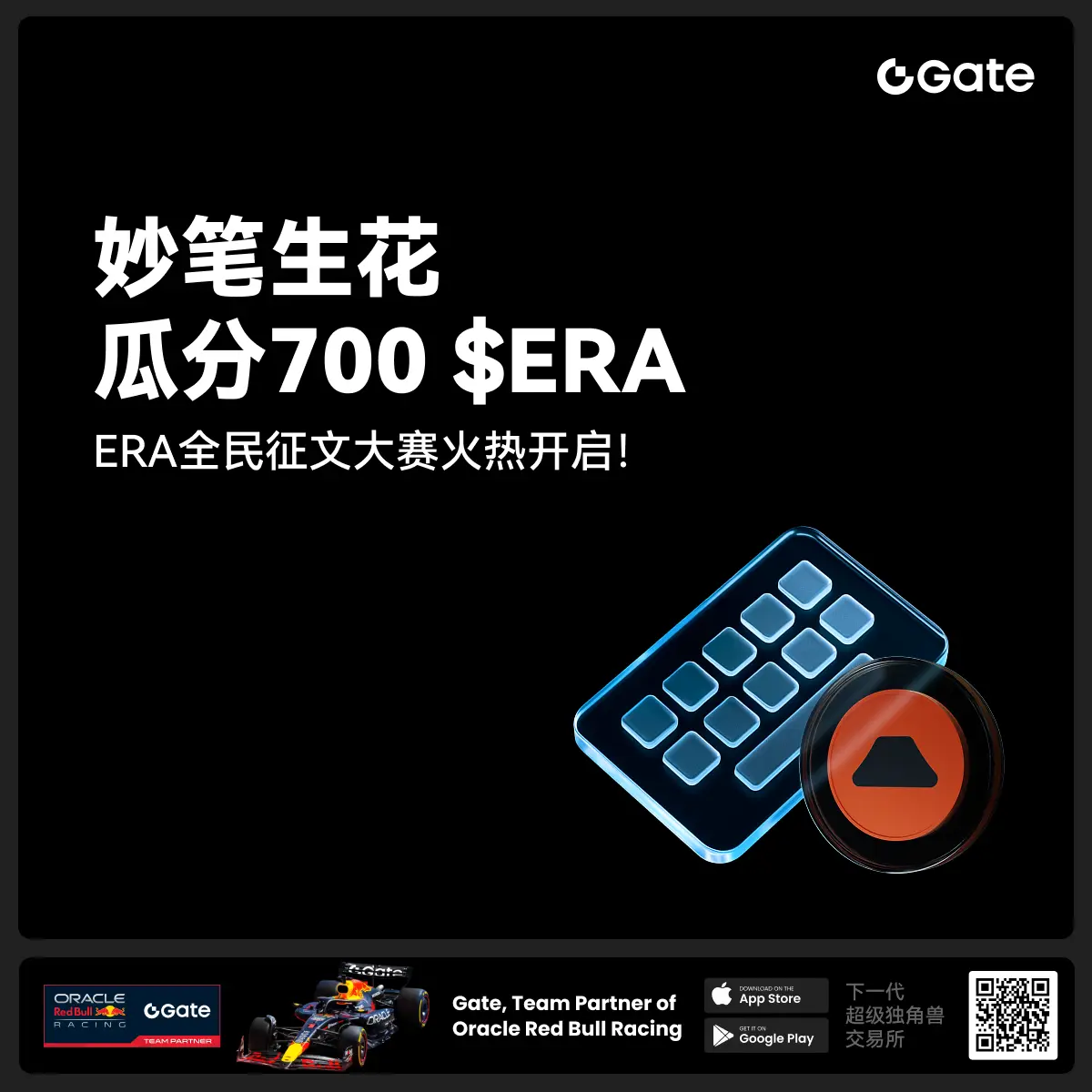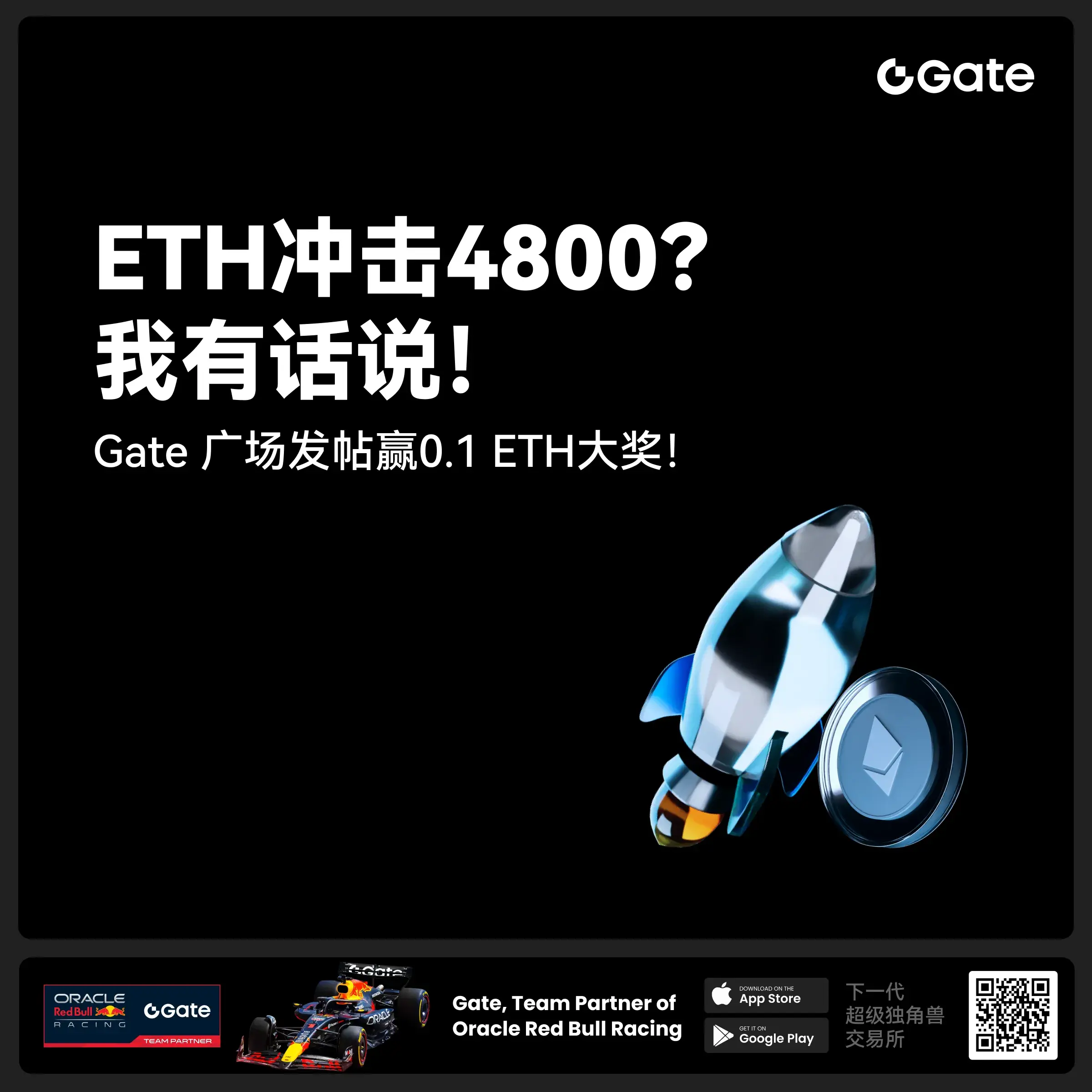更多
- 話題1/3
30753 熱度
14780 熱度
22641 熱度
22041 熱度
16481 熱度
- 置頂
- 📢 #Gate广场征文活动第三期# 正式啓動!
🎮 本期聚焦:Yooldo Games (ESPORTS)
✍️ 分享獨特見解 + 參與互動推廣,若同步參與 Gate 第 286 期 Launchpool、CandyDrop 或 Alpha 活動,即可獲得任意獎勵資格!
💡 內容創作 + 空投參與 = 雙重加分,大獎候選人就是你!
💰總獎池:4,464 枚 $ESPORTS
🏆 一等獎(1名):964 枚
🥈 二等獎(5名):每人 400 枚
🥉 三等獎(10名):每人 150 枚
🚀 參與方式:
在 Gate廣場發布不少於 300 字的原創文章
添加標籤: #Gate广场征文活动第三期#
每篇文章需 ≥3 個互動(點讚 / 評論 / 轉發)
發布參與 Launchpool / CandyDrop / Alpha 任一活動的截圖,作爲獲獎資格憑證
同步轉發至 X(推特)可增加獲獎概率,標籤:#GateSquare 👉 https://www.gate.com/questionnaire/6907
🎯 雙倍獎勵機會:參與第 286 期 Launchpool!
質押 BTC 或 ESPORTS,瓜分 803,571 枚 $ESPORTS,每小時發放
時間:7 月 21 日 20:00 – 7 月 25 日 20:00(UTC+8)
🧠 寫作方向建議:
Yooldo
- 🎉Gate 2025 上半年社區盛典:內容達人評選投票火熱進行中 🎉
🏆 誰將成爲前十位 #Gate广场# 內容達人?
投票現已開啓,選出你的心頭好
🎁贏取 iPhone 16 Pro Max、限量週邊等好禮!
📅投票截止:8 月 15 日 10:00(UTC+8)
立即投票: https://www.gate.com/activities/community-vote
活動詳情: https://www.gate.com/announcements/article/45974
- 📢 #Gate广场征文活动第二期# 正式啓動!
分享你對 $ERA 項目的獨特觀點,推廣ERA上線活動, 700 $ERA 等你來贏!
💰 獎勵:
一等獎(1名): 100枚 $ERA
二等獎(5名): 每人 60 枚 $ERA
三等獎(10名): 每人 30 枚 $ERA
👉 參與方式:
1.在 Gate廣場發布你對 ERA 項目的獨到見解貼文
2.在貼文中添加標籤: #Gate广场征文活动第二期# ,貼文字數不低於300字
3.將你的文章或觀點同步到X,加上標籤:Gate Square 和 ERA
4.徵文內容涵蓋但不限於以下創作方向:
ERA 項目亮點:作爲區塊鏈基礎設施公司,ERA 擁有哪些核心優勢?
ERA 代幣經濟模型:如何保障代幣的長期價值及生態可持續發展?
參與並推廣 Gate x Caldera (ERA) 生態周活動。點擊查看活動詳情:https://www.gate.com/announcements/article/46169。
歡迎圍繞上述主題,或從其他獨特視角提出您的見解與建議。
⚠️ 活動要求:
原創內容,至少 300 字, 重復或抄襲內容將被淘汰。
不得使用 #Gate广场征文活动第二期# 和 #ERA# 以外的任何標籤。
每篇文章必須獲得 至少3個互動,否則無法獲得獎勵
鼓勵圖文並茂、深度分析,觀點獨到。
⏰ 活動時間:2025年7月20日 17
- 📢 ETH衝擊4800?我有話說!快來“Gate廣場”秀操作,0.1 ETH大獎等你拿!
牛市預言家,可能下一個就是你!想讓你的觀點成爲廣場熱搜、贏下ETH大獎?現在就是機會!
💰️ 廣場5位優質發帖用戶+X瀏覽量前5發帖用戶,瓜分0.1 ETH!
🎮 活動怎麼玩,0門檻瓜分ETH!
1.話題不服來辯!
帶 #ETH冲击4800# 和 #ETH# 在 廣場 或 K線ETH下 圍繞一下主題展開討論:
-ETH是否有望突破4800?
-你看好ETH的原因是什麼?
-你的ETH持倉策略是?
-ETH能否引領下一輪牛市?
2. X平台同步嗨
在X平台發帖討論,記得帶 #GateSquare# 和 #ETH冲击4800# 標籤!
把你X返連結提交以下表單以瓜分大獎:https://www.gate.com/questionnaire/6896
✨發帖要求:
-內容須原創,字數不少於100字,且帶活動指定標籤
-配圖、行情截圖、分析看法加分,圖文並茂更易精選
-禁止AI寫手和灌水刷屏,一旦發現取消獎勵資格
-觀點鮮明、邏輯清晰,越有料越好!
關注ETH風向,創造觀點價值,從廣場發帖開始!下一個牛市“預言家”,可能就是你!🦾🏆
⏰ 活動時間:2025年7月18日 16:00 - 2025年7月28日 23:59(UTC+8)
【立即發帖】 展現你的真知灼見,贏取屬於你的ETH大獎!
- 🎉【Gate 3000萬紀念】曬出我的Gate時刻,解鎖限量好禮!
Gate用戶突破3000萬!這不僅是數字,更是我們共同的故事。
還記得第一次開通帳號的激動,搶購成功的喜悅,或陪伴你的Gate週邊嗎?
📸 參與 #我的Gate时刻# ,在Gate廣場曬出你的故事,一起見證下一個3000萬!
✅ 參與方式:
1️⃣ 帶話題 #我的Gate时刻# ,發布包含Gate元素的照片或視頻
2️⃣ 搭配你的Gate故事、祝福或感言更佳
3️⃣ 分享至Twitter(X)可參與瀏覽量前10額外獎勵
推特回鏈請填表單:https://www.gate.com/questionnaire/6872
🎁 獨家獎勵:
🏆 創意大獎(3名):Gate × F1紅牛聯名賽車模型一輛
👕 共創紀念獎(10名): 國際米蘭同款球員衛衣
🥇 參與獎(50名):Gate 品牌抱枕
📣 分享獎(10名):Twitter前10瀏覽量,送Gate × 國米小夜燈!
*海外用戶紅牛聯名賽車折合爲 $200 合約體驗券,國米同款球衣折合爲 $50 合約體驗券,國米小夜燈折合爲 $30 合約體驗券,品牌抱枕折合爲 $20 合約體驗券發放
🧠 創意提示:不限元素內容風格,曬圖帶有如Gate logo、Gate色彩、週邊產品、GT圖案、活動紀念品、活動現場圖等均可參與!
活動截止於7月25日 24:00 UTC+8
3
US to investigate Brazil’s digital payment system
The United States has launched a formal investigation into Brazil’s digital trade practices, with a spotlight on Pix, the country’s instant payment system that has rapidly displaced private-sector competitors.
The probe, announced on Tuesday by US Trade Representative Jamieson Greer, will examine whether Brazil’s digital and trade policies unfairly disadvantage US companies.
Greer said the investigation will review Brazil’s “tariff and non-tariff barriers,” saying the country offers preferential treatment to other trade partners while disadvantaging US exporters.
Another focus is Brazil’s alleged penalization of American tech firms that refuse to censor political speech. In August 2024, Brazil’s Supreme Federal Court ordered a nationwide suspension of social media platform X, after Elon Musk refused to appoint a legal representative in the country.
The investigation marks the most recent escalation in tensions between the two countries. On July 7, Trump took to social media to call on Brazilian authorities to drop the prosecution of former President Jair Bolsonaro, which he called a “witch hunt.”
A few days later, Trump threatened the probe in a letter to Brazilian President Luiz Inácio Lula da Silva, along with a 50% tariff on Brazilian imports starting Aug. 1.
Related: Brazil fintech gets approval to become a Bitcoin treasury company
Pix and Brazil’s financial system
Launched in 2020 by Brazil’s Central Bank, Pix is a government-run instant payment system that allows people to send and receive money instantly, 24/7, at no or very low cost. Unlike traditional payment systems, Pix lets users bypass credit card networks entirely, enabling direct transfers through mobile apps, QR codes, or account keys.
With over 150 million users and acceptance at more than 60 million businesses, Pix has quickly become the backbone of Brazil’s digital economy. In only five years, it has become the default payment method for everything from street vendors to utility bills, transforming how money moves in the country.
The US probe will investigate whether Brazil has been favoring its local payment system over established American alternatives such as Mastercard, Visa, and other US-based fintech companies.
Related: Brazil’s 17.5% crypto tax: How the new rules hurt small investors most
The intersection of domestic payments and global finance
Although Pix is only available domestically, it’s part of a broader shift that has Trump and US officials concerned.
Crypto-fintech bridges like Truther allow people worldwide to send stablecoins and settle instantly into bank accounts via Pix. This enables individuals and businesses to bypass traditional finance rails such as the SWIFT system, PayPal and US remittance services like Western Union.
For Trump, the concern goes beyond the Pix payment system. As a member of the BRICS economic bloc — alongside Russia, India, China and South Africa — Brazil is part of a coordinated effort to reduce dependence on the US dollar and Western financial infrastructure.
In 2024, leaders adopted “BRICS Pay,” a cross-border payments platform to bypass SWIFT and facilitate local‑currency transactions. At a recent BRICS Summit in Rio de Janeiro, the bloc discussed creating a joint reserve currency as a US dollar alternative, a move that reportedly drew the ire of the US president.
Magazine: How the digital yuan could change the world… for better or worse